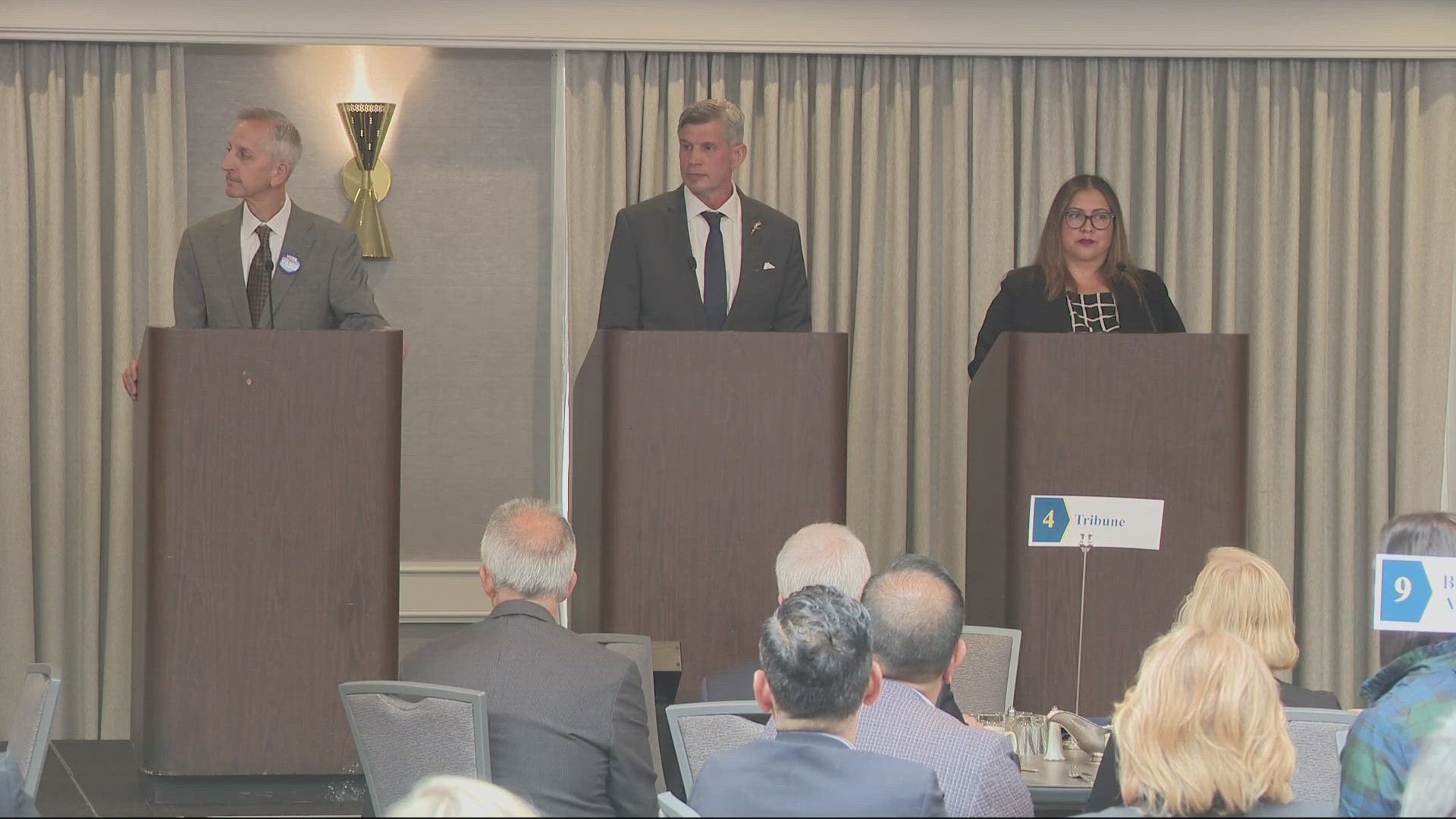PORTLAND, Ore. — The three leading candidates for Portland mayor met for the second debate of the 2024 election cycle Thursday morning. Rene Gonzalez, Carmen Rubio and Keith Wilson have emerged as the top fundraisers of the race thus far, breaking away from a much larger field of contenders.
Those same three candidates met for their first debate, hosted by Elemento Latino, on Wednesday.
Thursday's debate, hosted by the Portland Metro Chamber, touched on Portland's housing shortage, the homelessness crisis, public safety and policing, and the recovery of downtown.
Both Gonzalez and Rubio are sitting commissioners on the Portland City Council, while Wilson is president and CEO of a trucking company and founder of homelessness nonprofit Shelter Portland. They're vying for a mayor's position that will be transfigured somewhat from what it is now, as a voter-approved charter reform overhaul takes effect at the outset of 2025.
READ MORE: Portland City Council triples in size next year, taking on an entirely new role in local government
Despite recent revelations from The Oregonian and Willamette Week about Rubio's longtime habit of amassing unpaid parking tickets and Gonzalez's similar — if older and far less extensive — track record, the candidates kept it clean and stuck to their talking points, keeping the sniping to a minimum.
In their opening statements, the candidates each made their pitch to voters. Wilson invited Portland to break from the status quo, saying the city has become a "national symbol of failed policy" and pledging again to end unsheltered homelessness in a year through his plan.
But the commissioners also said they were unsatisfied with the status quo. Gonzalez, calling himself a lifelong Democrat, pointed to his advocacy for public safety and policies that would be tougher on homelessness, saying he's "fought that fight" in city hall. Rubio highlighted her success in passing policy to streamline housing construction and development, telling attendees that she's been the only one who has "delivered on your goals."

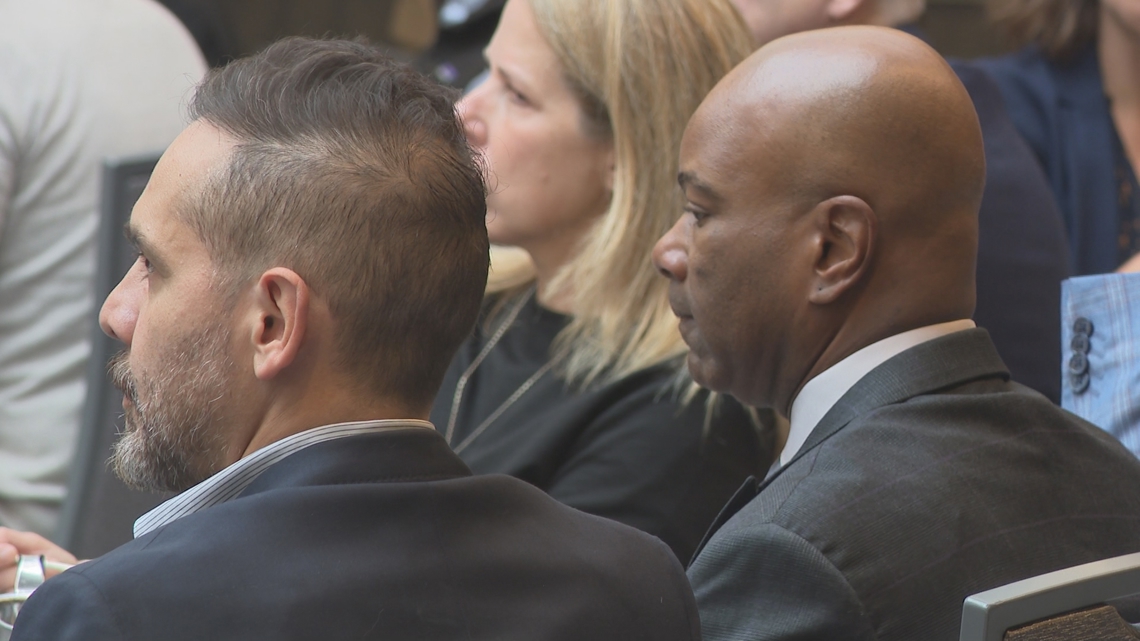
What they have to offer
Though the questions covered a range of topics, many of the candidates' answers came back to a few common points, relating either to their past successes or visions of the future.
Rubio was able to burnish her credentials as someone capable of crafting and passing key policy measures. Since Mayor Ted Wheeler reshuffled bureau assignments at the outset of 2023, Rubio passed incentives to spur housing construction, cleared the way for office space to be redeveloped into housing, and most recently passed the city's strategy for upping housing availability going forward, among other measures.
She said she's been successful in cutting deals and building coalitions, enabling her to get things done in government where they might have otherwise stalled.
Gonzalez has struggled to get his amendments and policy proposals through Portland City Council but described himself as a standard bearer for public safety and livability in the city since taking office in 2023, changing the dialogue and tamping down on "ideological" policymaking in city government.

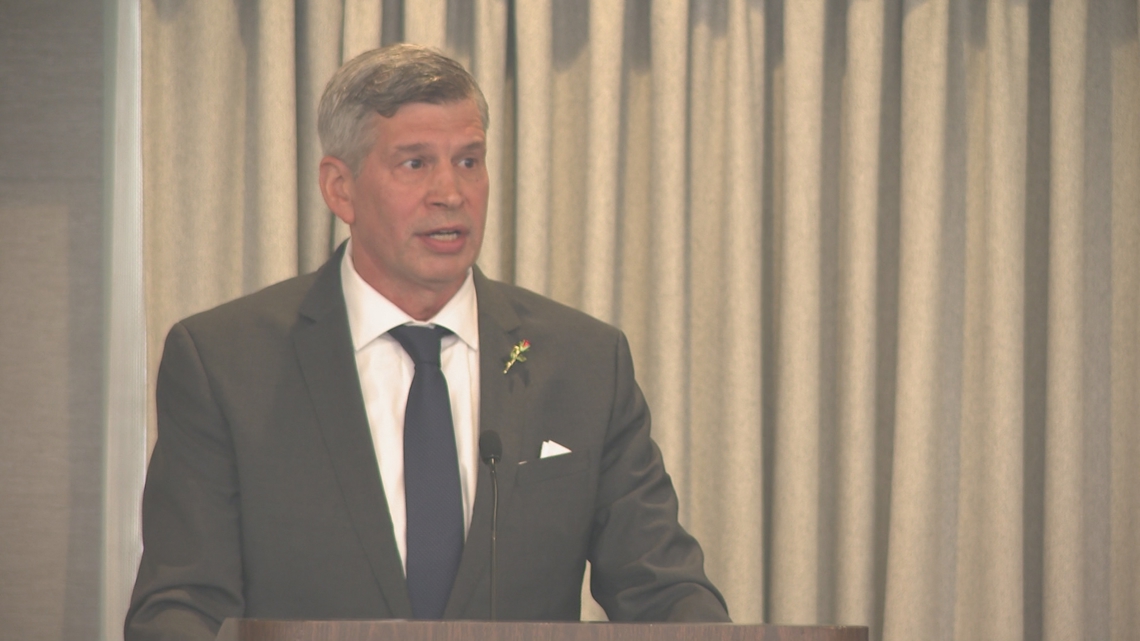
He pointed to his directive at the Portland Fire Bureau that halted Portland Street Response from handing out tarps and tents, and took credit for an ordinance that banned public drug use in Portland (which has not gone into effect due to state law).
Though a political newcomer, Wilson has laid out a clear strategy for what he envisions as an effective remedy for unsheltered homelessness, a process he's started through Shelter Portland. In his plan, the city would open up enough congregate shelters to take in essentially the entire homeless population each night, supplemented by day centers. Portland could then more effectively enforce its anti-camping ordinance. That would be just the first step, he indicated, but it would get people off the streets.
"I'm connecting people that were previously unsheltered a few weeks ago with services, and now they have shelter, and we've started offering jobs," Wilson said. "We have a way to care for our community — we are going to do this next year, with your help ... we have to care for our most vulnerable."
Wilson made clear that climate change and the environment are also major priorities for him. He said he was chief petitioner for House Bill 3590, passed in 2023, which directs Oregon State University's College of Forestry to research how wood waste from logging can be turned into low-carbon fuels.
Areas of conflict
Both Gonzalez and Wilson acknowledged Rubio's achievements on housing and development, but each criticized those measures as not going far enough. Gonzalez went so far as to call her efforts to help the central city an "abject failure."
He said he would re-tool Prosper Portland, the city's economic and urban development agency, to focus on "middle housing" instead of federally subsidized affordable housing, and said he wanted to cut down the permitting process so that applicants have an answer, one way or another, within 120 days.
Wilson, too, said that construction and development has been too slow and too expensive, and conversions from office space into housing haven't been happening despite the need. He said the city needs to remove roadblocks to speed the process.
Rubio's response to that kind of criticism was to point out that she was the only one present to make any sort of progress on those fronts, and that her opponents did not have specific plans to accomplish what they wanted.
On homelessness and public safety, the three candidates offered a spectrum of responses. Wilson said he wanted to get the city up to two police officers per 1,000 people in population. With roughly 800 sworn members at present, the Portland Police Bureau would need to add about 470 — over half again as many — to hit that target.

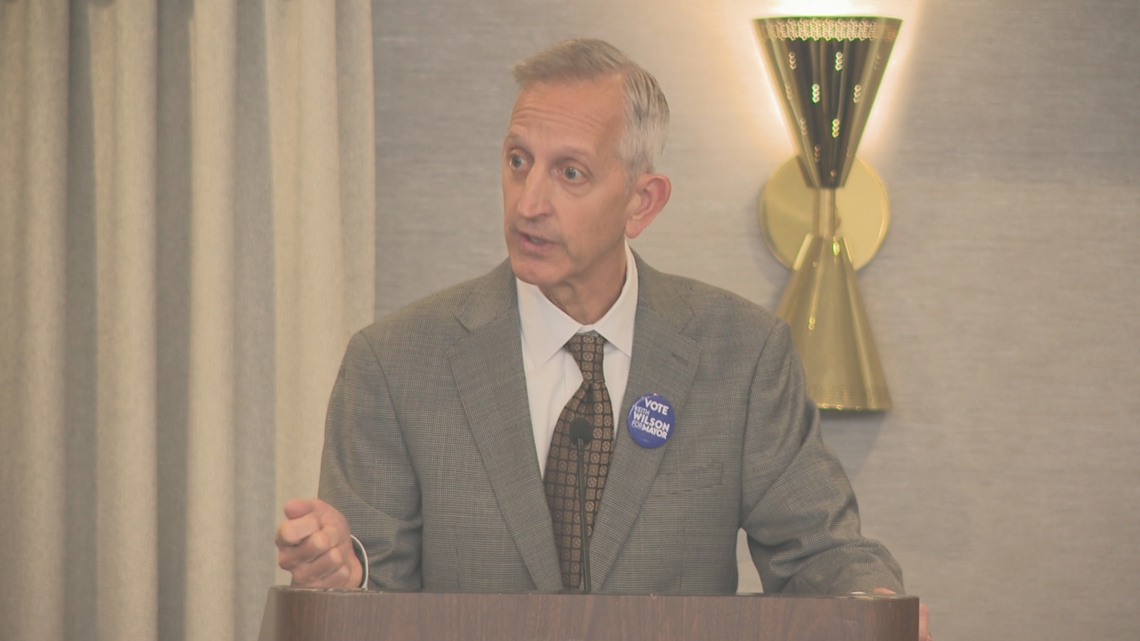
At the same time, Wilson claimed that roughly half of arrests in Portland are related to unsheltered homelessness, despite unsheltered homeless people making up about 1% of the population. By getting everyone into shelters, he suggested, it would cut down on crime.
Gonzalez favored "unrelenting" enforcement against homeless camps, and advocated for the city to get its police force up to 1,000 officers as soon as possible. He also highlighted public safety issues on Portland's east side, where few businesses have the resources to hire private security in the way that those in the central city have done.
"What my colleagues up here are unwilling to talk about is the importance of enforcement," Gonzalez said. "We have to set expectations for our sidewalks and parks that the sidewalk is for your child to walk to school, for your parents to walk to the grocery store."
In the past, Rubio has been reticent to outright ban homeless camps without first having shelter available for people to access, and she argued that the city has been making steady progress in opening up shelter options.
"Now, we're doubling down with our shelters with on-site services, with the goal of, eventually, permanent housing," she said. "And the initial data looks good — I believe that we are on the right track to make a huge difference if we stay the course and if we scale up."

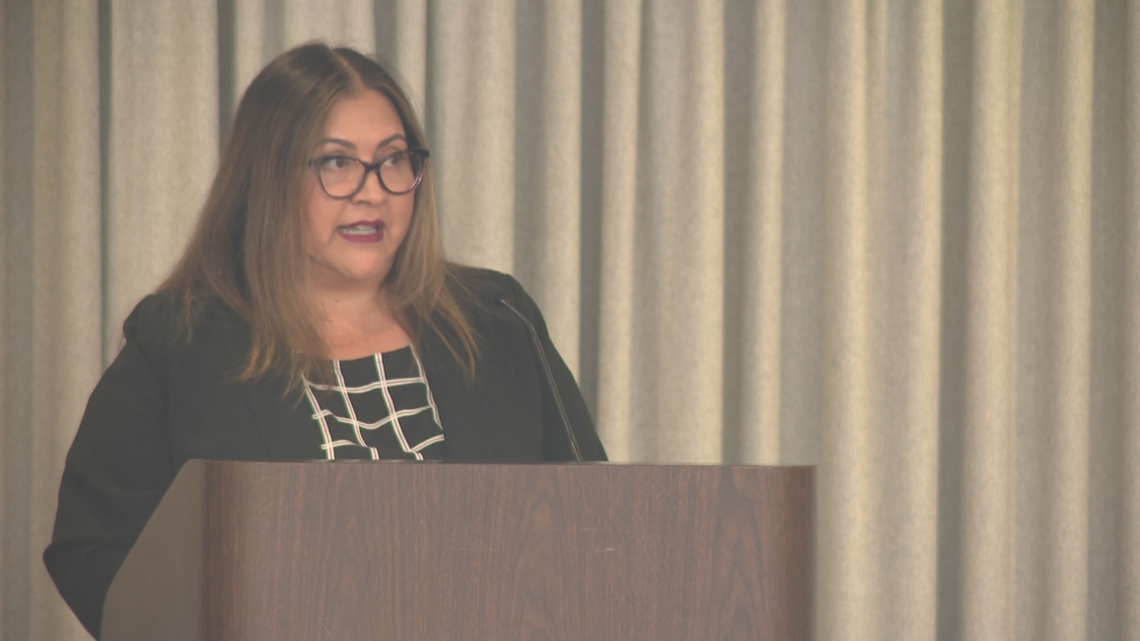
Rubio said she did support hiring more police officers, but cautioned that how the city grows its police force matters. She said she was pleased to see the Portland Police Bureau making a record number of new hires, and those recruits being more representative of the city at large. She added that she offered "real action, not just tough talk."
Wilson and Gonzalez also aligned with criticisms of the city's ballot initiatives and tax burden in recent years, albeit from different angles. Gonzalez expressed criticism with the initiative process as a whole, calling it "incredibly disruptive" to planning and pledging to advocate for taxpayers.
Wilson, on the other hand, said he supported a number of successful measures like the Supportive Housing Services tax, but felt that many of them collected funds far beyond what was expected, and they needed to be reined in.
Rubio diagnosed the problem as not being inherent to the tax measures, but to Portlanders feeling that the services they received were not worth the high cost. The city government needs to be able to pivot when these measures are passed and deliver for its citizens, she said.
The wrap-up
As the debate drew to a close, the candidates made their final pitches to the audience of business leaders. Gonzalez identified himself as a moderate centrist, one uninterested in pursuing ideological goals but capable of thinking big. He said he'd be willing to confront hard issues and adapt to the changing times.
Rubio asked the audience whether they wanted a mayor who would bridge divides or create them, pitching herself as someone who would be capable of working with a diverse city council and taking action in ways that will move the needle.
Wilson staked out his core values as quality, safety and sustainability. He promised "real change," saying that his opponents have had years to deliver results and have failed to do so — wasting millions of dollars and diminishing the community in the process.
Next month, candidates for Portland mayor will appear for a debate hosted by KGW and The Oregonian.

